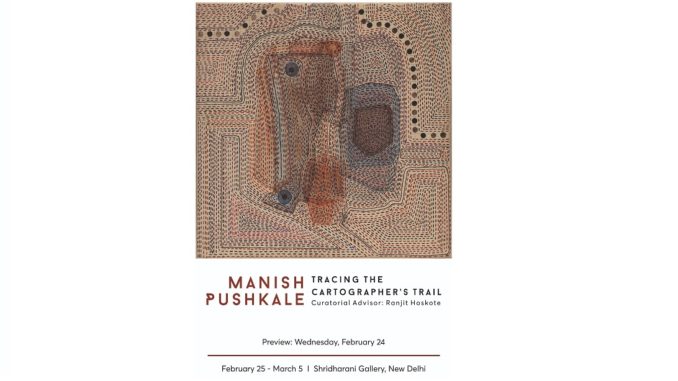
![]()
Manish Pushkale. Tracing the Cartographer’s Trail.
Curatorial Advisor: Ranjit Hoskote.
February 25-March 05 Shridharani Gallery, New Delhi
PAINTING AND SILENCE
(Being a story about how to look at a painting told by Manish Pushkale to Piyush Daiya)
I remember a story I once heard.
Priyamvada and Devavrata loved each other.
Priyamvada asked Devavrata — What can you do for me?
He replied — Whatever you ask.
She said — Think.
Devavrata bought her the most precious gifts in the world.
Priyamvada was in her room. Devavrata knocked on her door.
Priyamvada — Who is it?
Devavrata — It’s me.
Priyamvada opened the door.
Devavrata — Look, I’ve brought you the most precious things of the world.
Priyamvada — No, they are of no significance.
Devavrata left. Thought. Wandered aimlessly. Searched the entire cosmos. He
gathered the planets in his hands for Priyamvada. She was still waiting for him. He
knocked on her door.
Priyamvada — Who is it?
Devavrata — Me.
Priyamvada opened the door — No. Not this either.
Devavrata was mystified. Desperate. Puzzled. A long time passed.
Priyamvada waited. One day she heard a knock on her door.
Priyamvada — Who is it?
Silence.
She asked again — Who is it?
Devavrata — You.
I am standing in front of a painting.
***
![]()
![]()
![]()
![]()
***
Amongst contemporary modern Indian artists, Manish Pushkale occupies a unique position. Born and raised in Bhopal, Manish has carved a distinct identity not just in the global art world, but also as a youth icon and inspiration for aspiring young artists from Madhya Pradesh. It was Bharat Bhavan’s fertile, intellectual, creativity filled ambiance of the time that metamorphosed this innate desire into an ambition, and helped a young artist turn his dream into a reality. An autodidact, Manish remains one of the most successful products of Bharat Bhavan, where he developed and honed his artistic style, intellect and sensibility. The intellectual rigour of Bharat Bhavan’s founders in its early decades, its deeply held Indian values and its uncompromising artistic mission to foster these values in art, formed the foundation of Manish’s subsequent career as a celebrated abstract artist. On the several world stages where he is feted today, Manish pays tribute and brings fame and glory to Bharat Bhavan, Bhopal, and Madhya Pradesh. Apart from receiving numerous awards for his work, he has been a special invitee of the Government of France for it’s Festival of India in 2016, and a Fellow at the famous Institute of Advance Studies at Nantes, France in 2014. His large, meditative works adorn the walls of national and international museums and galleries, grace the collections of art connoisseurs and the rich and famous, form the subject of critiques and research papers of student artists and art critics, and have garnered him several prestigious national and international awards. Yet, no matter how far afield Manish’s works and fame travels, his artistic sensibility remains firmly rooted in the soil of his birthplace. Just as Bhopal’s rare blend of the modern and the ancient is embedded in the prehistory of Bhimbhetka and the antiquity of Sanchi, Manish’s abstractionism is but a channeling of this prehistory and antiquity into contemporary forms of expression. In today’s bustling art world, Manish’s calm, contemplative canvases are reflective of the unbroken emergence of civilization and its underlying spirituality, of genesis, progress and change. It is this reflective intellectualism that finds resonance with viewers, connoisseurs, critics and young artists alike. Manish’s upbringing in a devout Jain household, surrounded by an abundance of ancient and prehistoric sites lead him to do his Masters in Geology from Bhopal’s Barkat’ullah University. His deep interest in Geology and Archeology also underlay his intense desire to become an artist.
What he has received from Bharat Bhavan as a fledgling artist, Manish continues to return to the art world through his work with young artists. A willing mentor and inspiration to many aspiring artists from his home state, he provides them with artistic and commercial guidance, organizes art camps, and has curated several gallery exhibitions to help promote them, thus building a legacy framework for them to shoulder when they achieve success. His work as a Trustee of ‘The Raza Foundation’ and as the Executive Trustee of ‘The Krishna Sobti Foundation’, his establishment of ‘The Vaid Award’ in honour of the late writer Krishna Baldev Vaid, to appreciate radical Hindi writers, are efforts to contribute towards a sustainable artistic and intellectual legacy for future generations.
Manish’s intellectual leanings have also resulted in his lively engagement in debates and dialogues on matters of artistic dispute and discussion. He is a respected and widely read provocateur and art columnist for several Hindi newspapers, notably Lokmat, Jansatta, Samachar, and Prabhat Khabar. He is the editor of the art journal, ‘Aroop’, has penned a literary novel in Hindi, and several books on art, of which ‘Safed Sakhi’ is considered a standard of reference on the philosophical underpinnings of modern art. As a thoughtful and engaged citizen, Manish has incepted two live event series in Delhi, ‘Shastrartha : The Art of Civilized Dialogue’, which focuses on current issues, and ‘Underground Talks with Manish Pushkale’, his increasingly popular, monthly live talk show at the Habitat Centre in Delhi, where he converse with eminent guests from the fields of art and literature.
Although Manish has called Delhi his home for the last 25 years, his genesis and roots lie in the land of his birth, Bhopal and Madhya Pradesh, which he visits often.
*******
Notes --The story told by Manish Pushkale above is translated from Hindi by Alok Bhalla. --Source: Safed Saakhi, by Manish Pushkale and Piyush Daiya (New Delhi: Vani Prakashan, 2011), pp. 143-144.

Leave a Reply